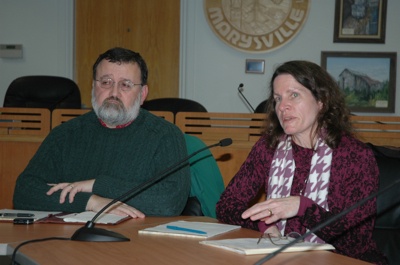MARYSVILLE — Marysville and Everett residents expressed their frustrations with ongoing odors in the area at a Jan. 5 meeting in the Marysville City Council Chambers that was intended to facilitate fact-finding for citizens, elected officials and regulatory agencies alike.
State Rep. Hans Dunshee moderated the discussion between community members, including the Citizens for a Smell Free Marysville and Beyond, and representatives of the Puget Sound Clean Air Agency, the Snohomish County Health District and the state Department of Ecology.
Laurie Halvorson, director of compliance and legal for Clean Air, pointed out that the south Marysville and north Everett area, where the smells have been reported, has up to four inspectors on call to respond to complaints, which they strive to do within 10-20 minutes of receiving those calls. At the same time, she clarified that the high volume of complaint calls that Clean Air occasionally receives does mean that it’s “almost impossible” to respond to them all, although she assured citizens that any complaints received by phone or via e-mail are being logged.
Marysville resident Suavek Lobrow had spoken to Clean Air officials during a community meeting last year, and reminded Anderson that, as of Sept. 9, out of 457 recorded complaints and more than 100 investigation visits for odor in Marysville and Everett from June 29 to Sept. 1, Clean Air inspectors were not able to document any violations against the alleged source of the smell, Cedar Grove Composting on Smith Island in Everett.
“Your process is ineffective,” Lobrow said. “The source of the smell may have already stopped producing the smell by the time it travels to our homes, so if you’re hoping to measure it by tracking it back to its source, then you’re already going to be behind. It’s completely backward.”
Halvorson and Laurie Davies, program manager for Waste 2 Resources at the Department of Ecology, noted that their agencies are currently reviewing their processes due to concerns such as those expressed by Lobrow. Davies cited Ecology’s public participation grant as a means for citizens to hire an independent inspector, while Halvorson reported that two notices of violation have been served against Cedar Grove’s Smith Island facility since the Sept. 9 community meeting. These notices, along with several others against Cedar Grove’s Maple Valley facility, will be the subject of a state hearing in March.
Marysville resident Byron Muck was one of several meeting attendees who voiced dissatisfaction with Clean Air’s current “smell test” method of rating odors on a zero-to-four scale of severity, citing its lack of instrumentation as a weakness.
“What the inspector might classify as a ‘one,’ I might classify as a ‘four,'” Muck said. “What if he has a sinus infection? There’s got to be some other means of measuring this. It doesn’t feel like it’s based on facts and data.”
Steve Van Slyke, manager of compliance for Clean Air, acknowledged that machines do exist to analyze the particulate content of the air, but they’re so specific in the substances they search for that they might miss the odors that people experience. He likewise concurred with Dunshee’s assessment that such machines are currently considered developmental technology by the courts, which would make it difficult to take legal action based on their findings.
A number of area residents are literally sick of dealing with this problem. Jerry Carson was outraged over Cedar Grove allegations, during a Dec. 19 presentation, that the Marysville water treatment plant and a landfill near the Tulalip Reservation were the sources of these smells instead, while Frankie Perigard recounted how her asthma has worsened since 2006, but only when she’s in Marysville or Everett.
“When I travel, I don’t have this cough,” Perigard said. “When I open my window in the morning, my eyes burn.”
“I’ve had friends visit from out of state who were ready to puke from this smell,” Carson said. “How can Cedar Grove deny this? It’s insane that they’re even trying. I love Marysville and I don’t want to move away, but I might have to.”
Because Cedar Grove is applying for a permit for an anaerobic digester at Smith Island, the agencies involved are exploring ways of making on-site monitoring part of that facility, as they’ve done for Cedar Grove’s Maple Valley facility. Dunshee explained that classifying such odor complaints as more than nuisance violations would require legislative changes, and elaborated that he and other state legislators had won an exemption from the governor’s freeze on new rules, specifically to pursue new laws regarding composting facilities.
“My mother and father live right here, so every time I see them, I’m calling up Cedar Grove to schedule another on-site visit,” said Aran Enger, environmental health specialist for the Snohomish Health District.
Marysville Mayor Jon Nehring credited groups such as Citizens for a Smell Free Marysville and Beyond with making such changes happen by taking the initiative and putting pressure on their elected officials and regulatory agencies alike.
“When you get active, you’re the ones who make this go,” Nehring said.
For more information, log onto the Citizens for a Smell Free Marysville and Beyond website.
The Puget Sound Clean Air Agency complaint website is www.pscleanair.org/contact/complaint.aspx. To report an odor by phone, call the agency at either 206-343-8800, ext. 6, or 800-552-3565, ext. 6. You can also report it via e-mail at inspection@pscleanair.org.



